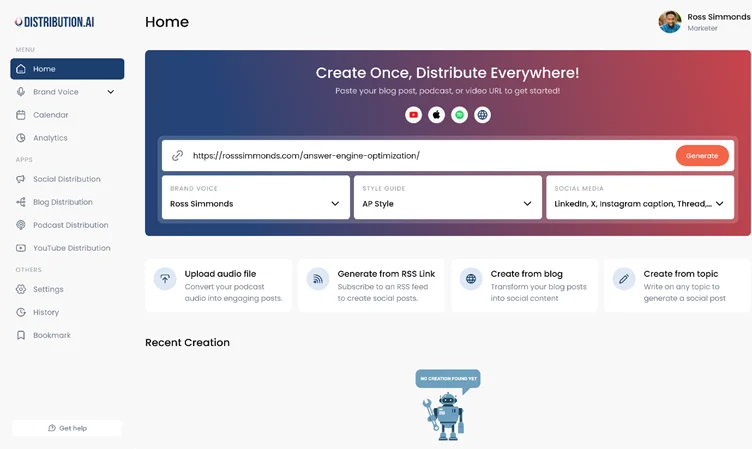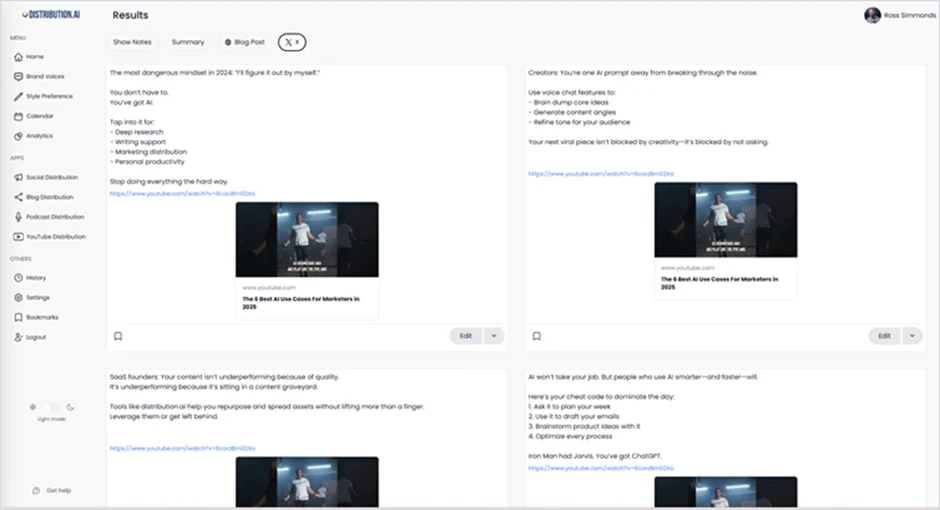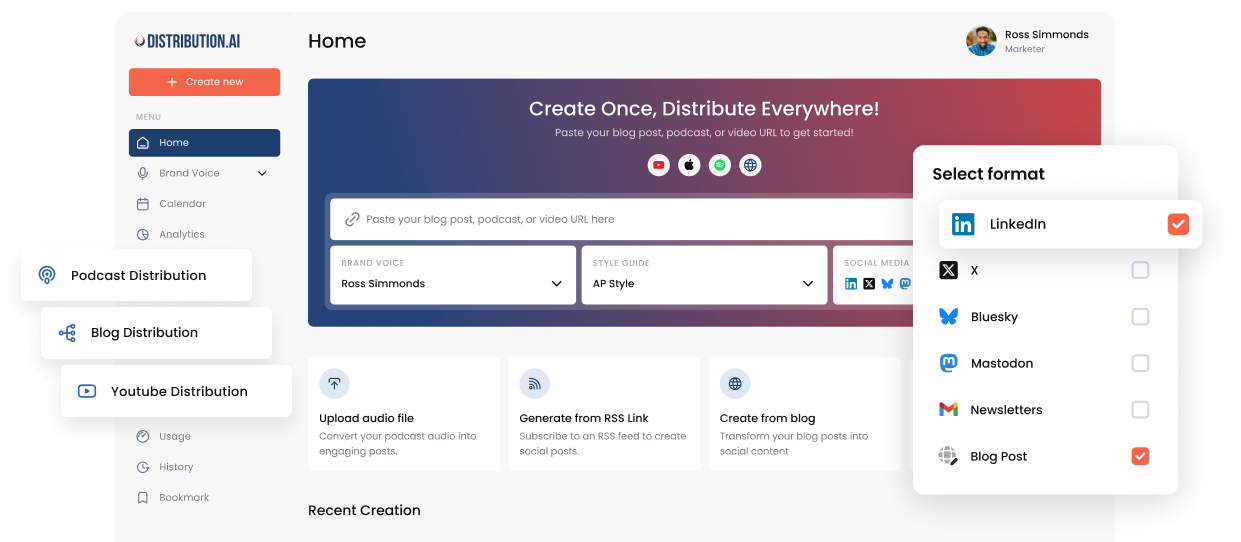What a Social Media Manager Does in 2026: Skills, Strategies & Tools
Discover the role of a social media manager in 2026. Explore their responsibilities & skills, AI-powered workflows, tools, and growth strategies that work.

Social media is one of the biggest growth channels for brands today. And behind every strong online presence is a social media manager making it happen.
The role of social media managers has expanded far beyond posting updates. Today, social media managers plan strategy, create content, analyze performance, manage communities, and keep up with the pace of platform changes.
As AI reshapes how content is created and distributed, the job is evolving even faster. Whether you’re exploring this career or building a social media team, this guide breaks down what a social media manager does, the skills they need in 2026, and the tools that make the work easier.
What Is a Social Media Manager?
A Social Media Manager develops and executes a brand’s social media strategy so it aligns with overall digital marketing goals.
They manage day-to-day activities like planning and scheduling content, drafting posts, coordinating visuals, monitoring engagement, and running social media campaigns across platforms such as Instagram, LinkedIn, Facebook, Twitter (now X), TikTok, YouTube, and other social media platforms.
Social media managers are responsible for:
- Growing brand awareness through consistent and engaging content
- Generating leads and conversions with a structured content strategy
- Strengthening brand reputation by maintaining an active, authentic, and strong online presence
- Building community and trust through two-way engagement
Social media managers also track social media analytics and often leverage AI-powered tools to simplify repetitive work such as scheduling, analytics, content creation, repurposing, and more.
In short, a social media manager acts as the brand’s voice on social channels, ensuring every post and interaction reflects its personality and values.
What Are the Core Responsibilities of a Social Media Manager?
Beyond drafting posts, social media managers handle multiple responsibilities that drive engagement and business growth.
Planning and strategy development
- Align social media goals with wider marketing objectives and define measurable KPIs.
- Perform social audits and competitor analysis to identify opportunities.
- Choose the right social media platforms based on audience type, such as LinkedIn and X for B2B, Instagram and TikTok for B2C.
- Use AI tools to forecast trends, plan calendars, and optimize posting schedules.
Content creation, repurposing, and distribution
- Maintain a consistent content calendar and social media planner that blends educational, promotional, and community posts.
- Tailor copy and visuals for different social platforms.
- Repurpose blogs, podcasts, or videos into short, shareable posts using AI-driven tools.
- Plan and execute content distribution across social media platforms.
Publishing content and community engagement
- Use analytics to identify best posting times and ensure consistent posting.
- Engage with followers by responding to comments and messages.
- Moderate discussions, encourage UGC, and host live sessions to boost interaction.
- Track audience sentiment using social listening tools to adapt strategies in real time.
Analytics and optimization
- Measure results using social media analytics like engagement rate, impressions, CTR, and conversions.
- Generate easy-to-understand reports with tools like Google Analytics and present them to stakeholders.
- Use AI insights to identify top-performing content and refine strategies for better ROI.
Paid media and collaboration
- Manage paid social campaigns on Facebook, Instagram, or LinkedIn—from budgeting to performance tracking.
- Collaborate with cross-functional teams, including marketing, SEO, and content marketing, PR, and design.
- Manage influencer and partnership campaigns that extend brand reach and authenticity.
- Track click-through rates, impressions, likes, reposts, and interactions to refine your social media strategy.
What are the Must-Have Skills for Social Media Managers in 2026 and Beyond?
The role of social media managers is evolving. Social media management today demands both creative and analytical thinking. As AI and social media automation become integral, these five core social media skills are crucial for social media managers to succeed.
1. Communication and storytelling
At the core of social media is written (and visual) communication. Social media managers must be able to craft social posts that capture attention, spark interest, and communicate brand voice consistently. Clear, concise, and on-brand messaging is a must—even in a 280-character tweet.
2. Creativity and visual intelligence
Standing out in crowded social feeds requires a balance of creativity and authenticity. For example, while Instagram demands visually creative and aesthetic posts, LinkedIn’s algorithm is more about authentic, relevant, and value-driven content. So, managers must think visually and creatively to craft posts, graphics, carousels, and videos that align with the social platform as well as the brand’s story. High potential management can help identify and develop team members whose creativity and strategic thinking make social content more engaging and impactful.
3. Data and analytical thinking
Data literacy is no longer optional. Social media managers must interpret social media KPIs and metrics like engagement rate, CTR, and conversions to identify what’s working and what’s not. Tools like Google Analytics and native dashboards help turn numbers into insights that shape social media marketing strategy.
4. Adaptability and trend awareness
Algorithms and social media trends change rapidly. Most successful social media managers stay ahead by experimenting with new content formats, tracking viral patterns, and adapting social media marketing strategies quickly with the help of AI tools.
5. AI fluency and tool mastery
You cannot deny the significant role of AI in social media. In 2026, top-performing managers should have the key skill of leveraging AI to create content, schedule, and publish it. They understand how to collaborate with AI for ideation, copy refinement, repurposing, and audience analysis so they can improve efficiency without losing creativity.
For example, several social media managers use Distribution AI to repurpose their best content assets. The tool helps generate multiple social posts from a single content piece—blog, podcast, video—all in your brand voice and optimized for each platform’s format.

How AI Helps Social Media Managers Work Smarter?
The biggest shift in social media management today is AI. And social media managers must know how to work with AI to ensure efficiency. Here’s how managers can use AI for their jobs:
Content ideation and repurposing
AI can surface topic ideas from what’s already working, such as top-performing posts, blogs, videos, or podcasts, and turn a single asset into many short, platform-ready pieces — captions, carousels, short scripts. This cuts brainstorming time and increases content velocity without losing brand voice.
- Feed a blog or podcast and get multiple post drafts tailored to each social media platform.
- Use AI to A/B test headline/caption variations quickly and choose winners.
Faster content production & on-brand visuals
AI speeds up creative production. You can use AI tools to create content, draft captions, write hooks, and create visuals like images, infographics, or even short videos for your social media channels.
- Auto-generate short-form videos or clip long videos into Reels or shorts.
- Auto-create images or templates that match brand guidelines and edit them as required.
Smarter scheduling & performance optimization
AI recommends the best times, formats, and frequency for each social channel by analyzing historical engagement and platform signals so you can post your content more strategically. This helps you drive more engagement and growth.
- Auto-suggest optimal posting times and cross-post schedules per platform.
- Auto-run creative tests (A/B) and surface the best-performing variants for scale.
Social listening, sentiment analysis, and early crisis detection
AI-powered social listening tools can scan vast conversations and flag sentiment shifts or spikes in negative mentions, allowing teams to triage PR issues before they escalate. This makes it easier to track brand mentions, monitor trending topics, and helps with crisis management.
- Real-time alerts for sudden brand mention spikes or negative sentiment trends.
- Automated sentiment summaries and topic clusters that point to the root cause.
Predictive analytics & action recommendations
Rather than dumping raw metrics, modern AI dashboards translate engagement, CTR, and conversion data into next-step recommendations. This helps social media managers act faster by doubling down on what works and eliminating what doesn’t.
- Predict which post types or audiences will likely convert next month.
- Auto-generate stakeholder-ready insights with charts and AI insights.
Growth Tactics for Social Media Managers
Here are some growth tactics successful social media managers use for driving engagement across all social media accounts.
Use trend-led social listening to publish faster than competitors
Most brands monitor social media trends and brand mentions, but only a few act on insights within 24–48 hours. Set up keyword alerts for your brand, competitors, and niche topics using social listening tools. When a trend spikes, whether it’s a new reel format, a customer sentiment shift, or a topic gaining traction, use a prepared reactive playbook:
- Who drafts the content?
- Which platform gets priority?
- What CTA fits?
Have 3–4 pre-designed templates or trend frames ready so you can publish fast without losing brand consistency. This helps your social media presence stay relevant, timely, and algorithm-friendly across social media platforms.
Build micro-influencer networks to multiply engagement
Instead of chasing large influencers, collaborate with micro-influencers in your niche with 10k–100k followers. Their audiences are highly engaged and far more aligned with your target market. Create a 60–90 day collaboration plan:
- Weekly comment-level engagement on their posts
- Joint posts or co-created videos
- Monthly livestreams or community Q&As
Pair this with a small “engagement circle” of peers who commit to interacting with your posts within the first hour. This combination strengthens algorithmic signals, drives authentic engagement, and expands your social media reach without paid campaigns.
Repurpose long-form content into multiple high-impact formats
Strong social media managers turn one long-form asset into 6–10 posts designed for different social media platforms. Start with a blog, podcast episode, or YouTube video. Pull out key insights, then convert them into platform-native formats:
- LinkedIn text post
- Instagram carousel
- TikTok or Reels snippet
- X (Twitter) thread
- Quote graphics or infographics
This allows you to maintain a consistent content strategy and increase publishing frequency without creating everything from scratch. It also keeps your message aligned across social media accounts while reaching new audiences through multiple content formats.

Launch content challenges that encourage community creations
Top brands and creators drive growth by hosting themed challenges, such as ‘Show us your setup,’ ‘Share your 30-second tip,’ or ‘Behind-the-scenes week.’ Create a simple guideline, announce the hashtag, and invite users to submit posts on their own social media accounts. Pick weekly or monthly winners and feature the best submissions on your brand page.
This builds community-driven content, improves your social media efforts, and strengthens your online presence organically. It also turns your audience into collaborators, giving them ownership in the brand’s story while filling your content calendar with authentic UGC.
Build a visual content library and rotate high-performing formats
Create a branded library of templates and visual assets, such as Q&A cards, how-to carousels, testimonials, short video frames, and behind-the-scenes snippets. Tag each asset by topic, target audience, and best social media platform. Then rotate formats weekly:
- Monday: How-to carousel
- Wednesday: Short video
- Thursday: UGC or testimonial
- Friday: Thought leadership
Track which formats consistently earn high engagement (saves, shares, comments) and refine the library every month. This system keeps your content fresh and consistent, reduces production time, and supports a strong social media presence across all channels.
Tools That Help Social Media Managers in 2026
Here are a few AI tools that can help social media managers work faster without sacrificing quality:
Design and Video Creation Tools
These tools help you create polished visuals, carousels, and videos that maintain brand consistency across social media platforms.
- Canva: Easy drag-and-drop templates for carousels, reels, and graphics, suitable for quick, on-brand content without relying on a design team.
- Adobe Express: A Lightweight version of Adobe with high-quality presets for creating professional visuals fast while staying within brand guidelines
- CapCut: Ideal for editing TikToks and Reels with clean transitions, text overlays, and trending effects that boost engagement
Scheduling & Publishing Tools
These platforms help you plan, organize, and publish content across multiple social media accounts without manual posting.
- Distribution AI: Repurposes existing content to generate multiple social media posts, schedules, and auto-publishes them across major social networks
- Buffer: Simple scheduling with platform previews and team approvals ideal for lean teams managing multiple channels
- Later: Strong visual planner for Instagram and TikTok scheduling, making it easier to design an aesthetic, consistent feed
Analytics & Reporting Tools
Analytics tools help you understand performance metrics, audience behavior, and what content drives results.
- Sprout Social: Detailed dashboards with cross-platform insights to help teams track engagement and refine strategy in real time
- Metricool: All-in-one analytics for impressions, reach, and click-throughs, great for benchmarking multiple accounts
- Google Analytics: Helps connect social traffic to website actions, making it easier to measure ROI from social media campaigns
Social Listening Tools
These tools scan conversations, track sentiment, and help you understand how people talk about your brand online.
- Brandwatch: Monitors trends and sentiment across large volumes of conversations so you can respond proactively
- Mention: Tracks brand mentions and keywords in real time, making it easy to respond quickly and manage reputation.
- Talkwalker: Offers deep analysis of topics, hashtags, and emerging trends, ideal for brands operating across global markets.
Project Management & Collaboration Tools
These platforms help teams coordinate content calendars, track campaigns, and streamline communication.
- Asana: Helps break social media workflows into clear tasks with deadlines, helping teams stay aligned on campaigns
- Trello: Card-based boards make planning posts, drafts, and reviews simple and visual for teams of any size
- Notion: A flexible workspace for content calendars, asset libraries, and approvals all in one shared hub
Final Thoughts
A social media manager does more than create posts. They shape brand voice, drive engagement, analyze results, and keep pace with ever-changing trends.
With AI stepping into the scene, the role of social media managers has evolved. In 2026, it demands a unique mix of creativity, analytical thinking, communication, and the ability to work with AI tools for efficient execution.
And as social media responsibilities expand, the day-to-day workload grows alongside the skill set. That’s why managers need AI to stay consistent and strategic while juggling multiple social accounts. Tools like Distribution AI help you create, repurpose, schedule, publish, and track posts from a single platform, automating most manual tasks so you can focus on social media marketing strategy and data analysis.
To see how Distribution AI makes social media management easier? Then
Frequently Asked Questions
Promote, repurpose & distribute your content with AI
Start 15-Day Free Trial
